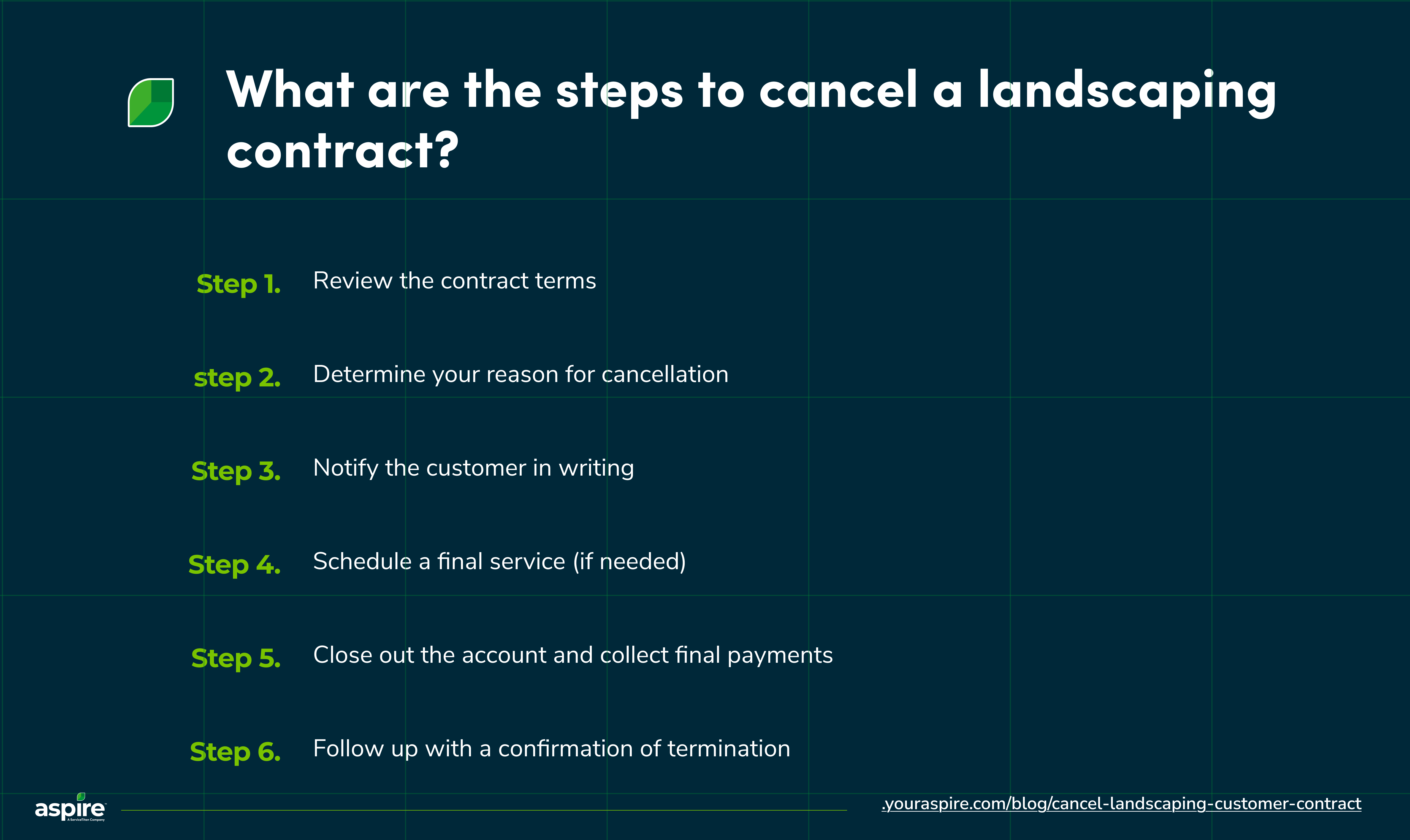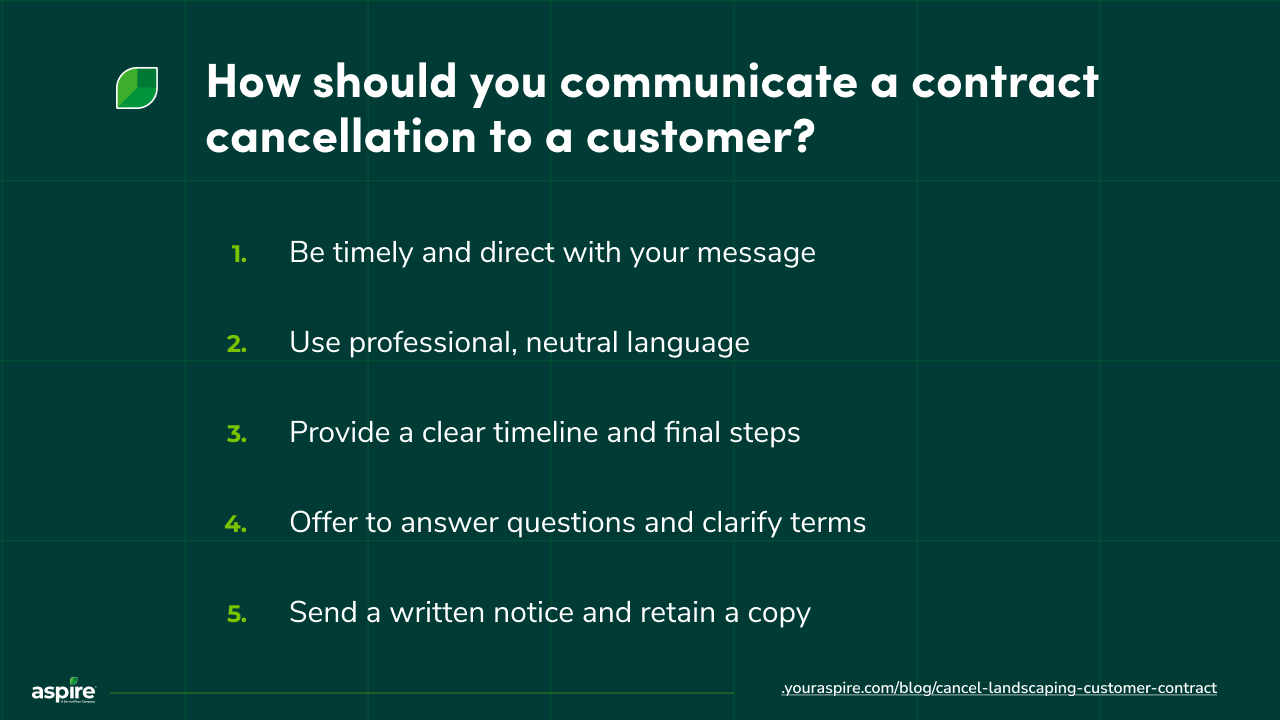Table of Contents
Table of Contents
- What are the legal considerations when canceling a landscaping contract?
- Check your contract’s termination clause
- Know your state laws regarding service contract termination
- Understand potential breach of contract risks
- Document everything to protect your business
- What steps are involved in canceling a landscaping contract?
- Step 1: Review the contract terms
- Step 2: Determine your reason for cancellation
- Step 3: Notify the customer in writing
- Step 4: Schedule a final service (if needed)
- Step 5: Close out the account and collect final payments
- Step 6: Follow up with a confirmation of termination
- What are the customer’s rights during contract cancellation?
- What happens if you break a landscaping contract without following procedure?
- You may face financial penalties or chargebacks
- Your reputation may suffer from negative reviews
- You could be taken to small claims court
- It may complicate future customer relationships
- What are the alternatives to canceling a contract?
- How should you communicate a contract cancellation to a customer?
- Be timely and direct with your message
- Use professional, neutral language
- Provide a clear timeline and final steps
- Offer to answer questions and clarify terms
- Send a written notice and retain a copy
- How do you handle disputes during a contract cancellation?
- How to address unsatisfactory service that leads to cancellation
- Analyze the root cause of the dissatisfaction
- Monitor service quality and team performance
- Improve client communication
- Document and address recurring issues early
- Proactive scheduling and planning
- Over to you!
- How do you handle disputes during a contract cancellation?
- How to address unsatisfactory service that leads to cancellation
- Analyze the root cause of the dissatisfaction
- Monitor service quality and team performance
- Improve client communication
- Document and address recurring issues early
- Proactive scheduling and planning
- Over to you!
- Be timely and direct with your message
- Use professional, neutral language
- Provide a clear timeline and final steps
- Offer to answer questions and clarify terms
- Send a written notice and retain a copy
- How do you handle disputes during a contract cancellation?
- How to address unsatisfactory service that leads to cancellation
- Analyze the root cause of the dissatisfaction
- Monitor service quality and team performance
- Improve client communication
- Document and address recurring issues early
- Proactive scheduling and planning
- Over to you!
- Smarter Scheduling with Built-in Validations
- Enhanced Work Ticket Visits Report
- Faster Dashboards & More Powerful Search
- Dynamic Translation for Crew Notes and Comments
- Subcontractor Portal 2.0: Easier Access, Smarter Management
- Property View Now on the Schedule Board
Have you experienced any of these before?
A difficult client who makes it extremely hard to do your job.
A project with high labor costs that isn’t generating profit.
New high-paying jobs are in the pipeline, but your workforce is tied up with low-profit projects.
You’re considering canceling these contracts, but you want to do it professionally, without risking litigation or reputational issues.
The main problem is that you’re unsure of how to communicate your intentions. You fear it will damage the client relationship, your business reputation, or breach the contract terms, leading to possible lawsuits.
This guide will walk you through the proper steps involved in canceling a customer contract smoothly and legally while preserving your business integrity.
What are the legal considerations when canceling a landscaping contract?
Before discussing contract cancellation, here’s what you need to know and do…
Check your contract’s termination clause
A termination clause in your business contract defines how or when the agreement can be ended before natural completion. It defines:
Requirements for cancellation
Notice periods
Penalties
How to handle outstanding tasks
Ensure you check the contract for this clause before communicating your intentions with the client. This helps you tailor the message to align with the clause.
For instance, if the record shows the contractor may terminate the contract by providing 30 days’ notice and settling all open projects, that must be included in your message. Here’s what that could look like:
‘Dear [Customer Name],
After careful consideration, [your landscaping company] will no longer be able to provide our service to you due to extenuating circumstances. We are incredibly sorry about this.
Please be advised that this letter serves as notice of discontinuation of services. We will handle all outstanding landscaping projects on your property for the next 30 days so that you may have time to locate a suitable replacement.’
Know your state laws regarding service contract termination
While the general principles for contract termination require that both parties adhere to the contract's termination procedures, it’s important to know what your state laws demand for issues like this.
Don’t know what they are?
Consult a lawyer or an experienced landscaper in the state for information on service termination laws.
Understand potential breach of contract risks
Do you know what constitutes a breach of contract as written in the agreement?
It can happen if you:
Cancel the job without notice
Fail to meet agreed service timelines
Walk away without following the terms outlined in the contract
Canceling the contract agreement without following the right steps leads to a breach of contract. This means even though you sought to terminate the client agreement, you could:
Be penalized for not doing so correctly
Face legal action
Harm your landscaping business's reputation
So, it’s essential to carefully review contracts before taking action to protect yourself.
Document everything to protect your business
Keep detailed records of all activities related to a client before you consider terminating their contract. This keeps you safe if disputes arise.
You can track:
The original contract that includes the termination clause
Written communication with the client about any issues
Proof of notices given and the delivery method
Documenting everything shows you’ve acted professionally, communicated clearly, and taken the right steps. This protects your landscaping business, helping you avoid or successfully defend claims.
What steps are involved in canceling a landscaping contract?
Now that you’re clear on the key considerations before cancelling a contract, here are the steps involved in terminating one.

Step 1: Review the contract terms
Even though you’re responsible for drafting the contract, go over it again to familiarize yourself with the termination clause. This helps you form the legal foundation for ending the contract properly.
How long should notice periods be?
What’s the penalty for cancellation? Per the agreement, has the client breached the contract?
Did the client misrepresent facts that have now affected the contract?
Reviewing the contract provides answers to these questions and helps you uncover key insights that can:
Protect your landscaping business.
Ensure you’re not in breach of the contract, which could trigger legal action.
Step 2: Determine your reason for cancellation
Define why you need to cancel a client contract. Having clear reasons can help you:
Avoid clients challenging or attempting to invalidate the cancellation, which could expose you to lawsuits or claims for damages.
Prevent misunderstandings and client disputes.
Maintain a good business reputation and relationships.
Ensure a smooth termination process.
However, those reasons have to be legitimate, protecting the rights of both parties. Here are some legally sound grounds for cancellation:
Non-payment: Client has defaulted on their fees even after several reminders. This is a breach of contract since it’s the client’s primary responsibility.
Scope creep: Client keeps adding more tasks that are not included in the agreement, without compensation.
Seasonal business changes: You’ve got more high-revenue-generating projects and insufficient labor to handle them.
Sale or transfer: You sold/transferred the business to a third party, or the client sells their property.
Misrepresentation: The client provided false or misleading information about their property before the agreement was signed. For example, they claimed the area to be worked on was just 1,000 ft2, but it’s 3,000 ft2.
Step 3: Notify the customer in writing
Next, communicate your intentions to the client, ideally in writing for proper documentation. This could be a letter sent to their mailing address or an email.
Remember to be clear, polite, and professional when drafting the letter. Also, include the reason, final service date, and next steps.
Here’s a template you can use:
‘Subject: Notice of Service Discontinuation
Dear [Customer Name],
After careful consideration, we regret to inform you that [your landscaping company] will no longer be able to continue providing services to your property due to [brief reason, e.g., changes in service areas, limited staffing, or project constraints].
This letter serves as formal notice that our services will be discontinued as of [final service date]. Until then, we will complete any open or scheduled projects to ensure a smooth transition.
We sincerely appreciate your business and encourage you to use the remaining service window to find a suitable replacement. If needed, we're happy to provide a referral or answer any questions during this period.
Thank you for understanding.
Warm regards, [Your Full Name]’
Step 4: Schedule a final service (if needed)
To maintain a good business reputation, you can offer a final service visit. It’s a good opportunity to tie up open tasks and show goodwill.
If you’re recommending another contractor as a replacement, consider taking them along for an introduction.
This makes the transition smoother for the client and new contractor, encouraging them to recommend you in the future.
Step 5: Close out the account and collect final payments
Once all outstanding projects have been completed, wrap up all administrative tasks and proceed to collect payments.
Send the final invoice reflecting completed work and outstanding bills. Be sure to mark it as the final bill and include payment terms and a deadline.
And if the contract was canceled before completion, ensure the invoice reflects any partial payments, deposits, or cancellation fees as outlined in the agreement.
Once that’s done, close out their account on your system and inform them that no further services will be rendered.
Step 6: Follow up with a confirmation of termination
Finally, consider sending a follow-up message confirming the end of the contract. This ensures both parties are clear on the final status and helps prevent further confusion.
If possible, request and document their response for your records.
What are the customer’s rights during contract cancellation?
While it’s within your right to cancel contracts based on the termination clause, customers have several important rights designed to protect them. Here are some of them:
Right to advance notice and a clear explanation: Clients need to know your plans to cancel an existing contract ahead of time to find alternatives or perhaps appeal your decision. They also need to understand your reasons. Sometimes, they may not be aware they’re being difficult or in breach of contract. Informing them might just be the jolt they need to adjust.
Full or partial refunds: Customers may be entitled to refunds depending on the timing of the cancellation. For instance, a full refund is required if the project hasn’t fully started, and you must cancel. If you’re halfway through, partial refunds should suffice.
Right to dispute unsatisfactory work: If the client isn’t satisfied with the work you’ve done, it’s within their rights to demand a rework or some form of compensation.
What happens if you break a landscaping contract without following procedure?
It’s crucial that you follow due process before canceling a landscaping contract. If you fail to do that, here’s what could happen:
You may face financial penalties or chargebacks
Canceling contracts abruptly and without notice would typically result in financial fines. This could be in the form of:
Withheld payments: Clients will see no reason to pay since the contract was suddenly cancelled.
Refund demands: You could be required to refund payment in part or in full as compensation for not following the right process.
Cancellation fees or damages if they’re included in the customer contract.
Simply put, it results in lost revenue one way or another.
Your reputation may suffer from negative reviews
Customers may respond negatively to the cancellation on social media or review platforms like Google or Yelp. Which may ultimately lead to a bad business reputation.
And in today’s world, where customer recommendations determine whether or not a new customer hires a service, this puts you in a bad position. It impacts how potential clients view your landscaping business, preventing new opportunities.
You could be taken to small claims court
If you fail to follow the steps to cancel a contract outlined in the client agreement, you may be held liable for breach of contract.
Customers can sue the business for damages, which is typically time-consuming and expensive. It also damages your business’s reputation and credibility, even if you win the lawsuit.
It may complicate future customer relationships
Not following due process damages your customer relationship, reducing trust and any possibility of a landscaping referral. After all, who will recommend someone they don’t trust?
In the landscaping industry, this is something you want to avoid, as word-of-mouth and local reputation can define a business’s growth.
What are the alternatives to canceling a contract?
Before deciding on full contract termination, endeavor to resolve issues to preserve client relationships. This shows customers you care and aren’t just concerned about profits. Here are some alternatives to consider before pulling the plug:
Alternative 1: Offer a temporary service pause or reschedule appointments if your calendar is packed. Explain your current situation to the customer and provide different solutions they can pick from.
Alternative 2: Recommend subcontracting the project or transitioning to another provider.
Alternative 3: Renegotiate pricing terms if the client continues to expand the project’s scope.
Alternative 4: Bring a mediator to discuss concerns and work toward an amicable settlement. If a resolution is reached, you could be looking at a contract renewal.
Alternative 5: Scale back your services and offer a reduced version of the initial scope that aligns well with your current capacity.
How should you communicate a contract cancellation to a customer?
Informing clients about your decision should be done in the most professional way that preserves a good working relationship. Here’s how you can do that:

Be timely and direct with your message
Aim to keep the message clear, direct, and prompt. Giving early notice helps the client adjust quickly, find a replacement, and leaves room for dialogue.
Start with your intention (cancel the contract)
Followed by the reason
Include the notice period and wrap up
Being clear and early reduces friction, long disputes, or negative disputes.
Use professional, neutral language
Regardless of your relationship with the client, use a professional and neutral tone when communicating the situation. Keep the message polite, avoiding the blame game or emotional language that could incite the client.
This doesn’t just help protect your business reputation; it prevents clients from feeling attacked or embarrassed. As such, you get to avoid bad reviews or angry responses.
Provide a clear timeline and final steps
How long will it take to wrap up the engagement? Make it clear in the messaging.
It should include exact dates, outstanding landscaping services, and client responsibilities. Don’t leave the information you share to interpretation.
To keep everyone on the same page, let them know what has been done and what needs to be finished.
Offer to answer questions and clarify terms
Ending things professionally also means responding to any questions the client might have. Perhaps the letter wasn’t clear enough, and they need clarity.
This builds trust and preserves your relationship with the client. Who knows? Your reason for cancelling the contract might have just involved a misunderstanding.
Send a written notice and retain a copy
Share the note with your client to cover legal requirements. But remember to keep a copy for documentation and in case of future disputes.
How do you handle disputes during a contract cancellation?
Clients might not react well to your decision to cancel the contract. They could dispute the notice period, the quality of your lawn care services, or even have a different understanding of the termination clause in the agreement.
Should a client push back, here are some ideas on how to manage such conflicts:
Stay calm: Even if it’s a difficult landscaping client who has caused you problems, endeavor to remain calm. Avoid shouting in return since your business reputation is on the line here. Some clients might have done the worst, e.g., verbally abusing crew members. However, try to communicate your intention without lashing out.
Always refer to the contract: Sometimes, clients don’t read the contract terms, leading to assumptions about what they’re entitled to. Simply refer them to the contract if they’re proving difficult.
Consider third-party resolution: Mediation helps both parties discuss their concerns and work toward a voluntary resolution. The third party can be someone neutral whom you both trust to be professional. This can be a legal practitioner, a retired judge, or a professional with specialized knowledge.
Hire a lawyer: If the situation becomes too complicated, hire an attorney to handle the situation. This might cost you more, but it will be worth it. Alternatively, you can seek their advice on what to do in a situation.
How to address unsatisfactory service that leads to cancellation
Sometimes, it’s clients who cancel contracts due to poor landscaping service. Crew members fail to show up on time or don’t do a remarkable job as promised.
See how you can address such issues below, preserving your reputation and keeping clients happy.
Analyze the root cause of the dissatisfaction
Do a thorough interview of what went wrong. Did they log a complaint online or in person? Who was responsible for resolving their complaint?
Using a digital tool like Aspire’s CRM lets you investigate client issues deeply. It provides insight into the property, project type, issues raised, and crew assigned to them.
Once you’ve identified the root cause, contact the client, apologize for the inconvenience caused, and provide an actionable plan to resolve the issue.
Taking responsibility after unsatisfactory service can dissuade clients from cancelling a contract.
Monitor service quality and team performance
Track the crew’s job performance and service quality with Aspire. Its mobile application lets crew members share updates—pictures, videos, hours logged, and progress—from the job site. And with Aspire’s reporting feature, you can view the back end and ensure the team delivers high-quality service to the client.

Improve client communication
Keep clients updated at all times, as it shows them you’re committed to exemplary customer service. Message them when the crew is on the way, if there will be a delay, or if there are plans to reschedule.
Aspire’s customer relationship management (CRM) feature is an effective tool for improving communication. It even has email integration that lets you update customers and quickly respond to issues.
Document and address recurring issues early
If you’ve identified a recurring issue, such as uneven edging or poor cleanup across different projects, don’t wait for clients to raise concerns.
Be proactive, start by documenting the issue: when it happens, where, and who was involved. Aspire enables crews and clients to report issues as they happen. This helps you track how often they occur so you can address them on time.
Some proactive measures could be retraining your staff, adjusting schedules, or improving equipment. Solving problems early shows your commitment to improving service quality and can be a defense if the clients become dissatisfied.
Proactive scheduling and planning
Clients may feel neglected and compelled to cancel contracts due to poor scheduling. Missed appointments, rushed jobs, or overlapping tasks can create an impression of disorganization.
To avoid this, invest in proactive scheduling using tools like Aspire to set project timelines, assign the right crews, and plan around weather. It helps you view staff availability and optimized routes at a glance.

By staying ahead with planning, you not only improve reliability but also increase client trust, significantly decreasing the chance of cancellations.
Over to you!
Cancelling a client agreement is never an easy decision, but sometimes, it’s the best move for your business. Regardless of the reason—unprofitable projects, limited labor, scope creep—the key is to approach it legally and professionally.
By following the steps outlined in this guide, you can exit the agreement with integrity and minimal risk.
You can also use Aspire to manage contracts, track communication, and ensure compliance, making it easier to handle cancellations efficiently and professionally.
It also lets you monitor the value of each project and how your crew performs. This helps you identify how to reduce future contract issues and also shows which projects are most profitable for your business.
Book a demo to see how Aspire will help you streamline your workflow and focus on more profitable jobs.



![Landscaping Business Due Diligence: Complete Guide [2025] Landscaping Business Due Diligence: Complete Guide [2025]](http://images.ctfassets.net/3cnw7q4l5405/6FhiPCf8mCcAawEddWnUXm/69ff3b97b13c1f0ca6f6d956adc2dd07/Landscaping_business_due_diligence__complete__guide_-2025-.png)
![How to Hire a Bookkeeper for Landscapers: Full Guide [2026] How to Hire a Bookkeeper for Landscapers: Full Guide [2026]](http://images.ctfassets.net/3cnw7q4l5405/5AbVDtokUcXVBR3HYotDM8/dcafa256d702a0e2a4fa432e9de43fb7/How_to_hire_a_bookkeeper_for_landscapers.png)


